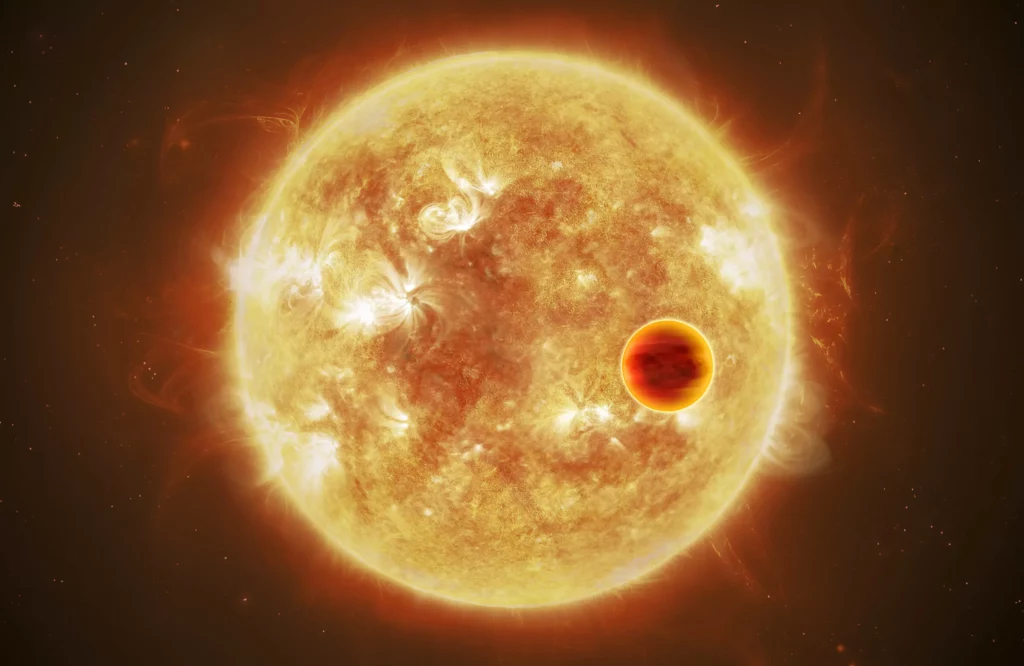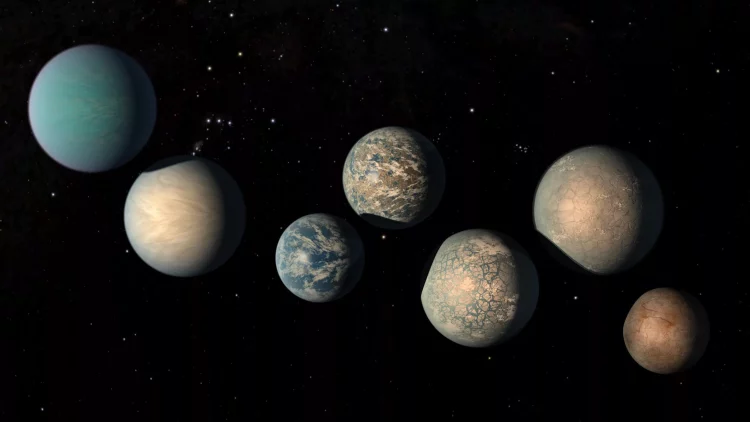Exoplanets, or extrasolar planets, are planets that orbit stars other than our Sun. The study of exoplanets has revolutionized our understanding of the universe, revealing a diverse array of planetary systems and challenging our concepts of planetary formation and habitability. This comprehensive article explores the discovery of exoplanets, the different types of exoplanets, methods of detection, notable examples, and the implications of their study for our understanding of the cosmos.
I. Introduction to Exoplanets
1. Definition and Classification
- Definition: Exoplanets are planets that exist outside of our Solar System, orbiting other stars. They can vary greatly in size, composition, and distance from their parent stars. The study of exoplanets is a branch of astronomy that focuses on identifying and characterizing these distant worlds.
- Classification: Exoplanets are classified based on various factors, including their size, composition, and orbital characteristics. Some common classifications include:
- Terrestrial Planets: Rocky planets similar to Earth, such as those that may exist in the habitable zones of other stars.
- Gas Giants: Large planets with thick atmospheres composed mainly of hydrogen and helium, similar to Jupiter and Saturn.
- Ice Giants: Planets with significant amounts of icy materials, like Neptune and Uranus.
- Hot Jupiters: Gas giants that orbit very close to their parent stars, resulting in extremely high temperatures.
- Super-Earths: Planets with a mass larger than Earth but smaller than Neptune.
II. History of Exoplanet Discovery
1. Early Theoretical Work
- Pre-Telescope Speculation: The idea that other stars might have planets was speculated upon long before telescopes were used. Early astronomers and philosophers, such as Johannes Kepler and Isaac Newton, pondered the existence of planets around other stars, but empirical evidence was lacking.
- First Exoplanet Discoveries: The first confirmed discovery of an exoplanet occurred in 1992, when astronomers Aleksander Wolszczan and Dale Frail detected two planets orbiting the pulsar PSR B1257+12. These were the first exoplanets found outside the Solar System, although they are not typical planetary systems as they orbit a rapidly rotating neutron star.
2. The Kepler Mission
- Launch and Goals: NASA’s Kepler Space Telescope, launched in 2009, was a groundbreaking mission designed to search for Earth-sized planets in the habitable zones of other stars. It used the transit method to detect exoplanets, focusing on a specific region of the sky and monitoring thousands of stars.
- Discoveries and Impact: Kepler significantly increased the number of known exoplanets, discovering over 2,600 new planets by the time its mission concluded in 2018. Its discoveries included a wide range of planetary types, from small, rocky planets to large gas giants, and provided valuable data on planetary system architectures.
3. The TESS Mission and Beyond
- Transiting Exoplanet Survey Satellite (TESS): Launched in 2018, TESS is designed to survey the entire sky and find exoplanets around nearby stars. It continues to build on the legacy of Kepler, focusing on bright stars that are easier to study with follow-up observations.
- Future Missions: Future missions, such as the James Webb Space Telescope (JWST) and various ground-based observatories, are set to advance our understanding of exoplanets further. JWST will provide detailed observations of exoplanet atmospheres and surface conditions, while upcoming ground-based projects will enhance our ability to detect and study exoplanets.
III. Methods of Detection
1. Transit Method
- Principle: The transit method involves detecting the periodic dimming of a star’s light as a planet passes in front of it, blocking a small fraction of the star’s light. This method is particularly effective for finding planets that orbit close to their stars.
- Advantages: The transit method allows for precise measurements of a planet’s size and orbital period. It is also useful for studying the atmospheres of exoplanets during transits, as the starlight passes through the planet’s atmosphere.
- Limitations: The main limitation of the transit method is that it requires the planet’s orbit to be aligned in such a way that it transits in front of the star as seen from Earth. This alignment is relatively rare.
2. Radial Velocity Method
- Principle: The radial velocity method, also known as the Doppler method, detects the gravitational influence of a planet on its parent star. As the planet orbits, it causes the star to wobble slightly, which affects the star’s spectral lines due to the Doppler effect.
- Advantages: This method provides information about the planet’s mass and orbital parameters. It has been successful in detecting many exoplanets, particularly those with large masses and close orbits.
- Limitations: The radial velocity method is less effective for detecting small, Earth-sized planets, especially if they are far from their parent stars. It also requires high-precision measurements and is limited by the star’s intrinsic variability.
3. Direct Imaging
- Principle: Direct imaging involves capturing images of exoplanets by blocking out the light from their parent stars. This method is challenging due to the brightness of stars and the small size of exoplanets.
- Advantages: Direct imaging allows for the study of exoplanet atmospheres and surface conditions. It is particularly useful for observing large planets with wide orbits and can provide detailed information about exoplanetary systems.
- Limitations: Direct imaging requires advanced techniques to suppress the star’s light and is limited by the contrast between the star and the planet. It is also more effective for young, hot planets that emit more infrared radiation.

4. Gravitational Microlensing
- Principle: Gravitational microlensing occurs when the gravitational field of a foreground object, such as a star with an exoplanet, acts as a lens and magnifies the light from a background star. This effect can reveal the presence of the foreground object and its planetary companions.
- Advantages: Gravitational microlensing can detect planets that are far from their parent stars and is not limited by the brightness of the host star. It is also useful for detecting planets in distant star systems.
- Limitations: The microlensing effect is rare and depends on the alignment of the lensing object and the background star. It also provides limited information about the planet’s properties and orbital parameters.
IV. Types of Exoplanets
1. Hot Jupiters
- Characteristics: Hot Jupiters are large gas giants that orbit very close to their parent stars, resulting in extremely high surface temperatures. They are often located within a few days of their parent stars.
- Examples: One of the most well-known hot Jupiters is 51 Pegasi b, which was the first exoplanet discovered orbiting a Sun-like star. The study of hot Jupiters provides insights into atmospheric processes and planetary migration.
2. Super-Earths
- Characteristics: Super-Earths are planets with a mass greater than Earth but less than Neptune. They can be rocky or gaseous and are often found in the habitable zones of their parent stars.
- Examples: An example of a super-Earth is Kepler-186f, which is located in the habitable zone of its star and is roughly 1.2 times the size of Earth. Super-Earths are of particular interest in the search for habitable worlds.
3. Mini-Neptunes
- Characteristics: Mini-Neptunes are smaller versions of Neptune, with thick atmospheres composed mainly of hydrogen and helium. They are typically larger than Earth but smaller than Neptune.
- Examples: An example of a mini-Neptune is GJ 1214b, which has a thick atmosphere and is located about 40 light-years from Earth. Studying mini-Neptunes helps scientists understand the diversity of planetary atmospheres.
4. Earth-Like Planets
- Characteristics: Earth-like planets are rocky planets with conditions similar to those on Earth. They are often located in the habitable zones of their parent stars, where liquid water could potentially exist.
- Examples: Proxima Centauri b is an Earth-like planet located in the habitable zone of the star Proxima Centauri. It is one of the closest exoplanets to our Solar System and a prime candidate for studying habitable environments.











































Discussion about this post